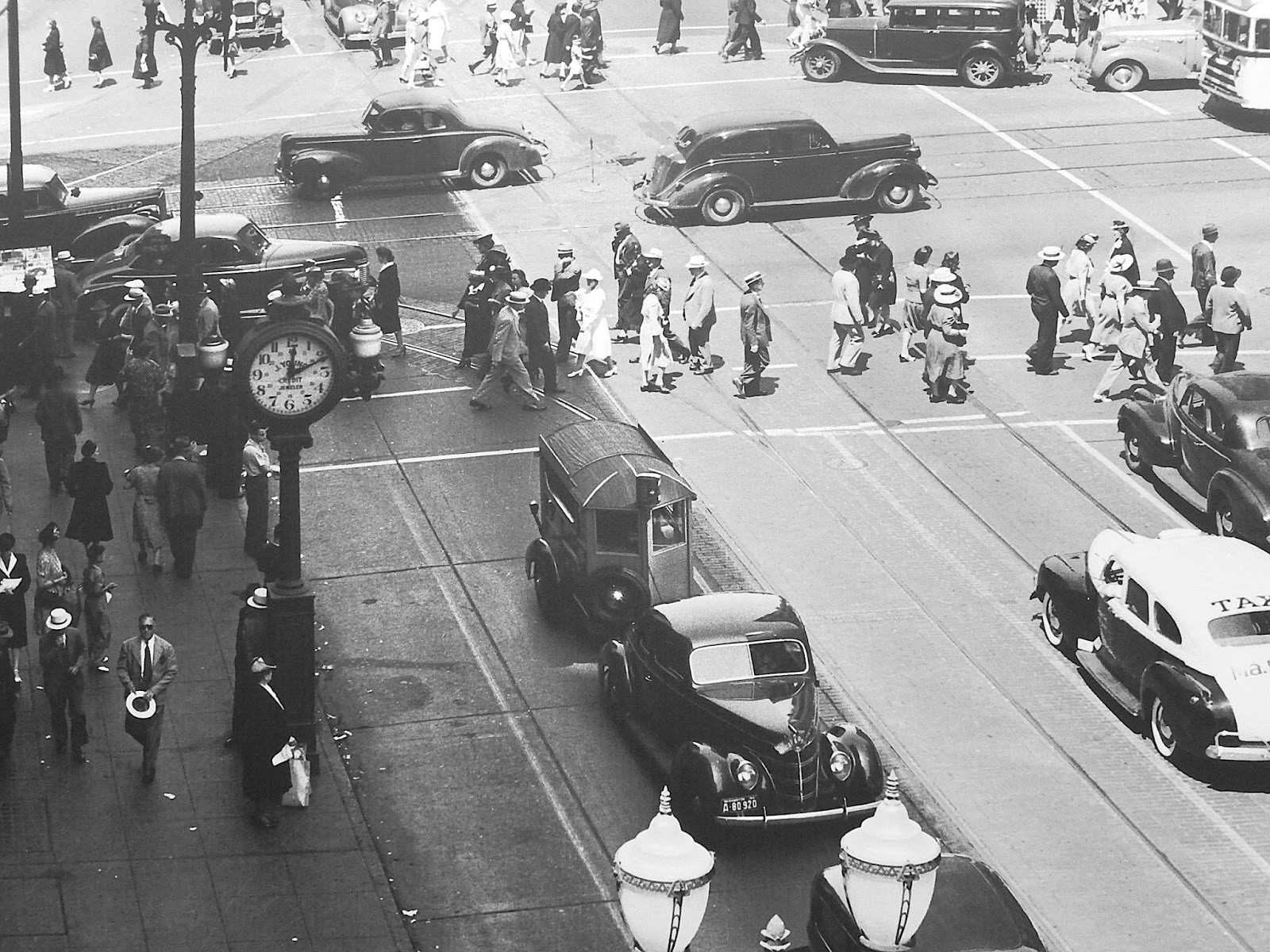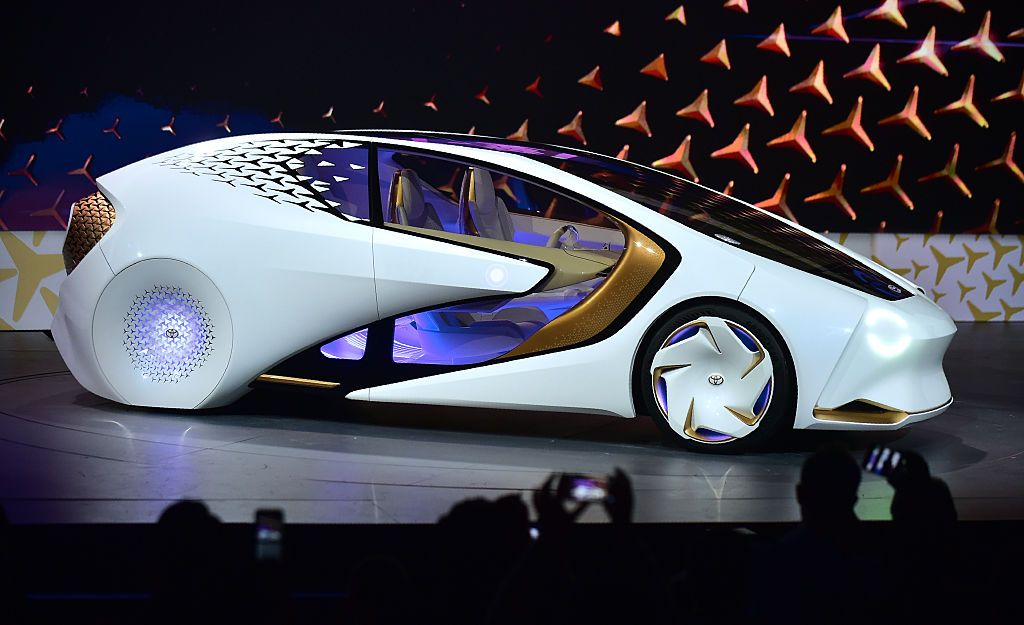This is another post in my occasional series showing historical views of cars in their native habitats. An automobile's design is done in isolation (apart from analysis of competing designs), but in the real world cars are seen with others of different sources and model years.
(It needs to be added that during eras when car styles were either rapidly evolving or pushing off in odd directions -- from 1934 to 1962 or thereabouts in the USA -- stylists did have to pay attention to the degree to which drastically new themes would be acceptable to potential buyers.)
I photographed the images below from a fascinating (to me) photomural at a Seattle drugstore. The setting is Seattle's main downtown intersection at the time (corner of 4th Avenue and Pike Street with Westlake Avenue branching off). I like the scene for its large variety of cars and because it was photographed at a time where various brands could be identified. That is, I find it difficult to identify brands in 1920s or earlier street scenes because the cars seem too similar: I'm basically a post-1930 car guy.
The mural caption states that it was taken in 1942, and it probably was. But it might as well have been the summer of 1941 for several reasons. The summer of 1942 was after the USA entered World War 2 in December of 1941. By that time, car production had been curtailed and gasoline rationing was in place in Seattle by June of 1942, so traffic would be expected to be comparatively light, not so busy as the photo shows. I see no military personnel, and some might have been evident were it 1942. About half the license plates are 1941 plates (the dark ones) and half are 1942s which is a wash -- about the same would have been seen either summer. Finally, I don't notice any 1942 model cars; the newest are '41 models.
That said, let's take a look.
Two slightly cropped images of the photomural showing the setting. They are fairly sharp, so you might try clicking on them to enlarge. The remaining photos were zoom shots, and enlargements are uselessly blurry.
Queue of cars. The fourth from the left in the near row is a 1941 Pontiac, helping to date the mural image. Most of the other cars here are from the 1930s. Second from the left in the near row is a 1937 Hudson.
The gray car by the crosswalk is a medium-price 1941 Packard, one of several Packards found in the mural. The cars next to and following the Packard seem to be from the late 1920s. At the top of this cluster is a dark 1941 Oldsmobile.
At the top is another late-20s car with its fixed sun visor and wood-spoked "artillery" wheels. The car in the foreground might be a 1937 or '38 Dodge.
That large, two-toned car at the curb is a 1940 or possibly a 1941 Chrysler. The taxi is a 1941 Dodge.
The Ford towing that odd looking trailer is a 1938 Ford Standard. At the extreme left is another Packard.
This is another post in my occasional series showing historical views of cars in their native habitats. An automobile's design is done in isolation (apart from analysis of competing designs), but in the real world cars are seen with others of different sources and model years.
(It needs to be added that during eras when car styles were either rapidly evolving or pushing off in odd directions -- from 1934 to 1962 or thereabouts in the USA -- stylists did have to pay attention to the degree to which drastically new themes would be acceptable to potential buyers.)
I photographed the images below from a fascinating (to me) photomural at a Seattle drugstore. The setting is Seattle's main downtown intersection at the time (corner of 4th Avenue and Pike Street with Westlake Avenue branching off). I like the scene for its large variety of cars and because it was photographed at a time where various brands could be identified. That is, I find it difficult to identify brands in 1920s or earlier street scenes because the cars seem too similar: I'm basically a post-1930 car guy.
The mural caption states that it was taken in 1942, and it probably was. But it might as well have been the summer of 1941 for several reasons. The summer of 1942 was after the USA entered World War 2 in December of 1941. By that time, car production had been curtailed and gasoline rationing was in place in Seattle by June of 1942, so traffic would be expected to be comparatively light, not so busy as the photo shows. I see no military personnel, and some might have been evident were it 1942. About half the license plates are 1941 plates (the dark ones) and half are 1942s which is a wash -- about the same would have been seen either summer. Finally, I don't notice any 1942 model cars; the newest are '41 models.
That said, let's take a look.
Two slightly cropped images of the photomural showing the setting. They are fairly sharp, so you might try clicking on them to enlarge. The remaining photos were zoom shots, and enlargements are uselessly blurry.
Queue of cars. The fourth from the left in the near row is a 1941 Pontiac, helping to date the mural image. Most of the other cars here are from the 1930s. Second from the left in the near row is a 1937 Hudson.
The gray car by the crosswalk is a medium-price 1941 Packard, one of several Packards found in the mural. The cars next to and following the Packard seem to be from the late 1920s. At the top of this cluster is a dark 1941 Oldsmobile.
At the top is another late-20s car with its fixed sun visor and wood-spoked "artillery" wheels. The car in the foreground might be a 1937 or '38 Dodge.
That large, two-toned car at the curb is a 1940 or possibly a 1941 Chrysler. The taxi is a 1941 Dodge.
The Ford towing that odd looking trailer is a 1938 Ford Standard. At the extreme left is another Packard.



















EmoticonEmoticon